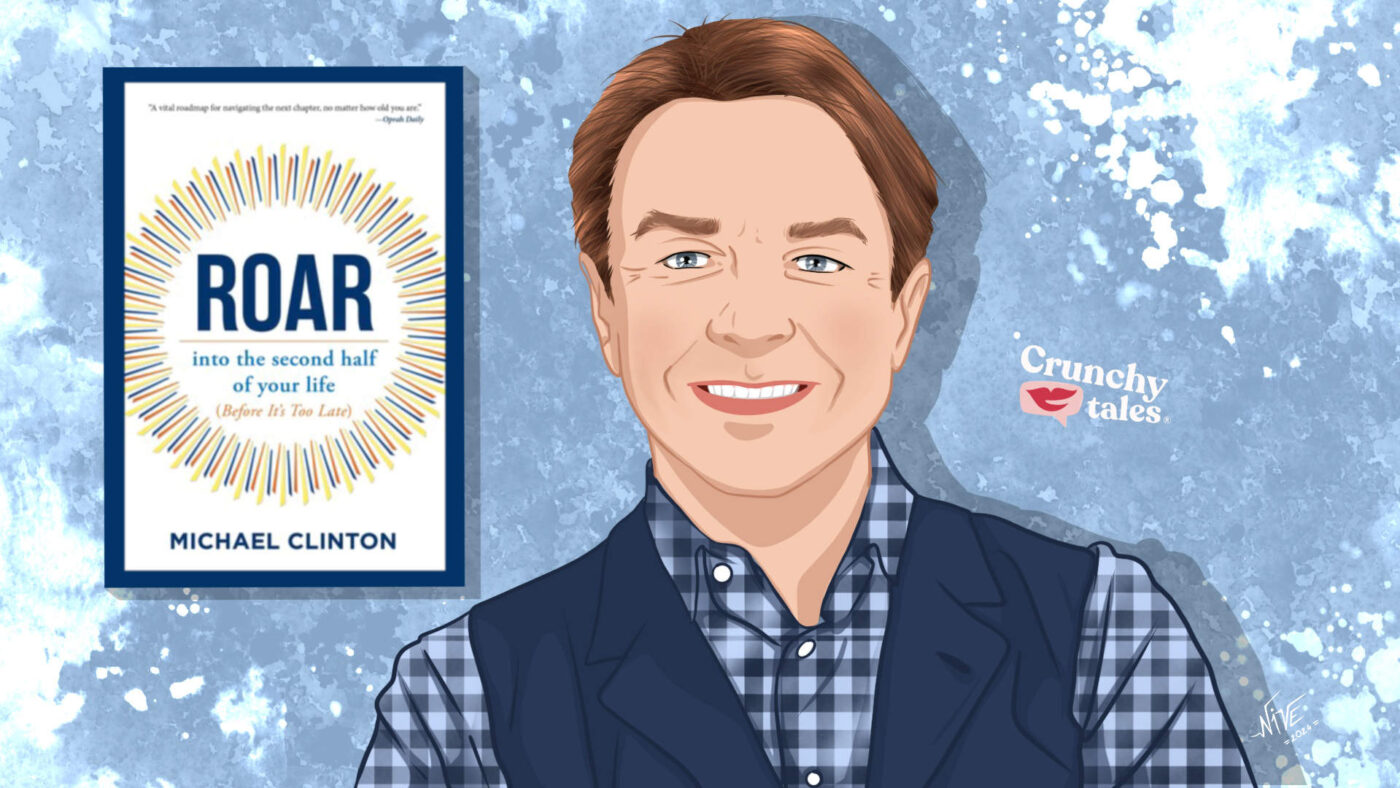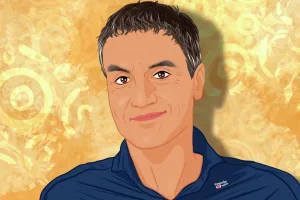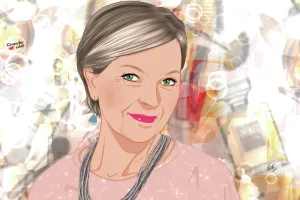Michael Clinton: “Reimagine Your Life Before Others Do It For You”
There’s this idea that super-successful people are these larger-than-life personalities. But often, the most inspiring ones are actually quite down-to-earth, almost like the person you’d chat with next door. They seem relaxed, confident, and genuinely excited about what’s always coming next.
That’s part of what makes Michael Clinton so intriguing. Author of “ROAR into the second half of your life (before it’s too late)“, an inspiring guidebook that will help you achieve your dreams and get more out of life—whether or not retirement is in your future plans, former president and publishing director of Hearst Magazines, marathon runner, pilot and founder of a nonprofit foundation The Circle Of Generosity, his success is undeniable, yet he has this laid back, approachable energy that calls you to dig a bit more to find out all about his secrets to a roaring second half-life and the way we can all reimagine it.
In a world where everyone seems to be reinventing themselves as a life coach trying to jump on the ‘ageing well’ bandwagon market, giving people a stereotypical formula for later in-life success, Michael Clinton is an authentic voice that really wants to help us -late bloomers- to nail it finally.
Michael, how did you come up with the idea of roaring forward in the second half of our lives?
You know, when you age, despite longer life expectancy, all the messaging is that you should be supposed to wind down and slow down, but that just didn’t sit right with me. I felt ready for the next challenge! So, I went back to school, got a master’s degree, trained for a big hike to the Everest base camp and launched a foundation. I was energized by these new experiences. Yet, there weren’t many positive messages out there about ageing as a time of opportunity and I was very frustrated. That’s what motivated me to write the book. I’ve interviewed 40 inspiring people who, like me were “re-imagining” their lives. I called them “re-imagineers.”
So, instead of retiring, you suggest we should be re-firing?
Some people decide to re-fire. I decided to rewire. We can all rewire ourselves for new opportunities in our next chapter. That’s the core idea behind my book. I’ve shared stories of people who are living life to the fullest in their later years and how they did it. The book’s success led to a whole movement – with a business, speaking engagements, and advocacy for a different kind of second half-life.
Can you give us some practical tips on how we can really re-imagine our future selves as we age? Where do we start and what we can do to re-wire our new chapter?
Many of us spend our lives identifying ourselves in what I call the 3 Ps – Partner, Parent, and Profession-. There’s no question that these three identifiers take up a lot of our lives. But then life changes, things change. In the book chapter “Life Layering“, I explain how you can step out of your identification as a parent, partner, or professional. The fundamental question to ask yourself is: who are you now? If you cannot answer that question outside of those 3 Ps, then you have to start thinking about who are you next. There are a few ways to do that.
Can you share some of them with us?
Sure. One way is going back to your younger self when you were in your twenties, there might be something that you were really interested in doing and then life took over. For instance, in the book we have a great story of a woman who became a writer in her late fifties. She always wanted to write mystery novels. So she finally went back to her younger self and realised it was about time to start to take online classes, go to conferences and learn the process. She then published her first book at 57 years old.
The other fun thing that I often suggest is asking your family and your friends to define you in five words. When you’ve asked 10 people about that, take all the words. What is the number one word that keeps coming up? It might be generous. It might be funny. It might be loyal. What’s your word and how can you build a persona off that word? Take it and turn it into who you will become next because your people are telling you that’s how they see you now.
Any other examples you’d like to mention?
Another great story I have in my book is about a midlife woman who was a teacher and then ended up today, in her sixties, to be a well-known standup comedian in the East Coast of America. Isn’t that amazing?
The most recurring word that everyone gave her was -funny, funny, funny-. So her daughter suggested taking her to a comedy club even though she didn’t know exactly what to expect. Then she went on the stage and yes, she was funny. She decided that maybe it had something to do with that word, so she started taking comedy classes, and online courses to learn how to do comedy.
But you have to take that word seriously and then say: “What can I do with that word”, right?
Yes, you should ask yourself: “How can I make that word special or unique for me?” My word was generosity, which I loved when people, my family and my friends gave me. I ended up starting a foundation called “The Circle of Generosity” which gives grants to families and people who are struggling. They are going to potentially be evicted and we’ll pay six months rent until they get back on to their feet.
Michael, do you feel the recurring word that came up from your peers lately is still the one that could have represented you when you were younger?
I think I was always a person who was in the process of reinventing himself. Growing up in a working-class family, education was my first act of reinvention. Being the first in my family to go to college meant forging a new path. Then, at 22, I reinvented myself again by moving to New York to pursue a career in publishing. So, yes, I think this idea of re-imagining, rewiring, reinvention has been a core part of who I am.
Do you think we can all learn the art of reinvention?
Absolutely. It’s about having the intention to grow and the focus to make it happen. Often, the biggest obstacle is our own mindset. As I always say, 50% of the challenge lies in getting your head in the game. Once you take that first step, the momentum builds. But the biggest hurdle is your own head.
But wouldn’t the environment also play a role? For example, the US might offer more opportunities for reinvention compared to other countries.
Well, it’s funny you should say that because I was with some American friends last week who just moved to Portugal and they’re 60. But yes, our culture is one of reinvention, however, there’s a lot of ageism in America. People in the US who are 60 and want to get a new job in their profession might find it very hard because of ageism.
However, the demographics are shifting. With so many people leaving their careers and a skills gap emerging, I believe the landscape will change.
Michael, do you have any role models in your age bracket?
Yes. I’m always looking for people who think about the possibilities of what they can be regardless of their age and I’m lucky to know many of them from whom I take inspiration. There’s a well-known American named Alan Patricof who is 90 years old. Alan launched a business in his 80s. He did the New York City Marathon when he was 87 and has just got remarried. Being someone like him who is very involved and engaged in life is very inspiring.
As you know, I’m a marathon runner. I watched the first 100-year-old man cross the finish line of a marathon. Maybe we’ll see if I can do it, too. So many people say that age is a state of mind, right? And maybe it’s true because, for instance, I still feel I’m in my 30s.
But in the end, we all have to put up with our ageing bodies, don’t we?
You’re absolutely right. Our bodies age, but I think, you know, there’s so much advancement in medicine that when combined with a healthy lifestyle can help us to live for many, many, many years that, you know, our parents and grandparents didn’t have. We shouldn’t have a fear of ageing.
If you go to Asia, there is a much different attitude about ageing. We can learn a lot from that world. But I think this negative approach to ageing is changing because there are so many people who are moving dynamically well into their 60s, 70s or 80s.
Last but not least, how can we challenge ageism in our daily life?
I’ll go back to other social movements. The women’s movement. Women as individuals and collectively challenged sexism. Is sexism gone? No. Same with racism and diversity and inclusion. But we can see the progress made in those movements. Now it’s very different than it was 50 years ago and I think It has to happen with individuals challenging the institutions and then collecting together to make significant changes.
In the end, ageism affects everyone, regardless of background. It doesn’t matter your race, your gender, your religion, your politics, your sexuality. It affects everyone. By working together, we can challenge the ageist things that are in our cultures. It could be very powerful.
Like this post? Support Us or Sign up to our newsletter to get more articles like this delivered straight to your inbox!






This Post Has 0 Comments